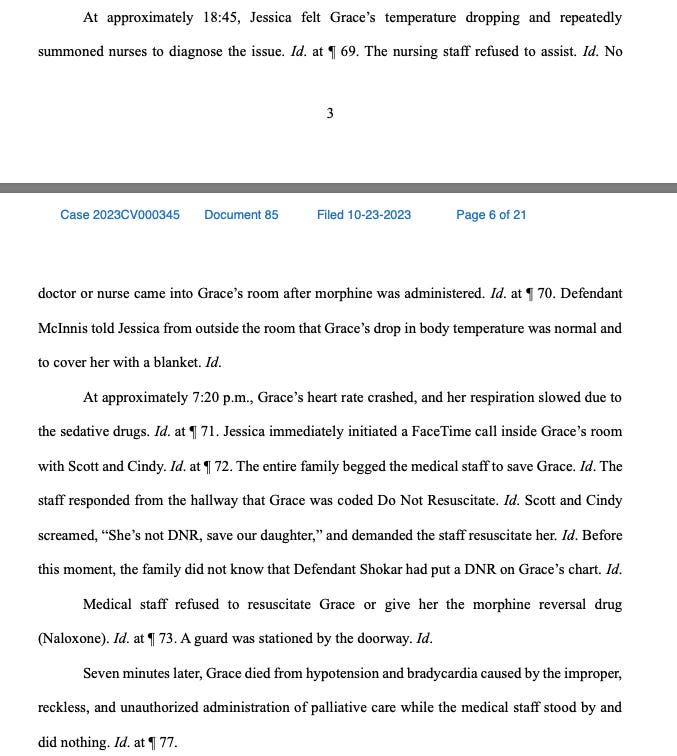Landmark Lawsuit Against Doctors and Nurses for Battery and Medical Murder is Going to Trial
"After an unauthorized DNR was placed on record, Grace was injected with morphine, Ativan, and Precedex without her or her power of attorney’s knowledge or consent. These actions killed her."
November 2, 2023: Medical malpractice and negligence has remained among the top 3 causes of death in United States for years. ‘Fortunately’ for hospitals, doctors, and other healthcare providers, the industry and its workers have been shielded by state laws and malpractice insurance for medical cases of injury, catastrophic injury, and wrongful death….until yesterday.
In the Scott Schara vs. Ascension Health lawsuit, Scott Schara filed a claim against; Ascension Health (St. Elizabeth’s Hospital), Dr. Gavin Shokar, Dr. David Beck, Dr. Romana Marada, Nurse Hollee McInnis, Nurse Alison Barkholtz, et al. for the wrongful death, medical negligence, violation of informed consent, and battery of his 19-year old daughter, Grace Schara while she was under their ‘medical care’.
What Was Done to Grace While She Was in St. Elizabeth's Hospital?
On October 13, 2021, 19-year-old Grace Schara died under a hospital-issued DNR (DO NOT RESUSCITATE) order after being given a combination of IV sedatives including morphine, Precedex, and Ativan over 6 days. These drugs are known as ‘end-of-life drugs’ and this was all done without her or her power of attorney’s (i.e. her father’s) consent, informed or otherwise.
Grace was a joyful and kind 19-year old teenager with Down syndrome who loved life, her family, Jesus, and Elvis.
When Grace’s father, Scott Schara, originally filed his claim against Ascension Health and their medical providers for battery and wrongful death, his complaint pointed out that US healthcare centers and workers were receiving billions of excess dollars through the CARES Act as ‘bonus payments’ for various tests, treatments, and diagnoses, including ‘COVID-19 death payments.’
Ascension and named healthcare providers (defendants) filed an absurd motion to dismiss (MTD) claiming that Grace and her family members were responsible for her death, not the lethal cocktail of sedative IV drugs that were administered to Grace combined with the DNR order the defendants issued prior to Grace going into heart failure caused by the cocktail of sedative drugs.
Page 14 of the legal brief states;
“The allegations of the Amended Complaint support punitive damages regarding Plaintiff’s battery claim. After an unauthorized DNR was placed on record and her power of attorney (her father) was removed from the premises, Grace was injected with morphine, Ativan, and Precedex without her or her power of attorney’s knowledge or consent. These actions killed her.
As alleged, this conduct was willful, wanton, or reckless, supporting punitive damages under Jones v. Fisher.”
Medical Murder Will No Longer Hide Behind the Veil of Malpractice
According to the EIN press release, yesterday, Judge Mark J. McGinnis rejected virtually all of the motions by the defense to dismiss Schara’s charges against them. “This case is ready to be tried in November,” he said.
The Schara vs. Ascension Medical case is the first of its kind that will redefine the impact and consequences of ‘intent’ in medical death cases. In other words, the healthcare workers at St. Elizabeth’s hospital are accused of maliciously labeling Grace’s patient file as DO NOT RESUSCITATE (DNR) after administering to her a lethal IV cocktail of ‘end of life medications’ known to cause death by inducing heart and lung failure.
Direct from the Plaintiff’s legal brief, on October 13, 2021 at St. Elizabeth’s Hospital;
“With the illegal DNR in place, the defendants (nurses and doctors) began to pile more drugs into Grace’s body.
All of these drugs (including morphine) were given without consent, informed or otherwise.
At approximately 6:45pm (on October 13, 2021), Jessica (Grace’s sister) felt Grace’s temperature dropping and repeatedly summoned nurses to diagnose the issue.”
The Legal Brief Goes On To State;
“At approximately 7:20 p.m., Grace’s heart rate crashed, and her respiration slowed due to the sedative drugs.
Jessica immediately initiated a FaceTime call inside Grace’s room with Scott and Cindy.
The entire family begged the medical staff to save Grace.
The staff responded from the hallway that Grace was coded Do Not Resuscitate.
Scott and Cindy (Grace’s mom and dad) screamed, “She’s not DNR! Save our daughter!” and demanded the staff resuscitate her. Before this moment, the family did not know that Defendant Shokar had put a DNR on Grace’s chart.
Medical staff refused to resuscitate Grace or give her the morphine reversal drug (Naloxone).
A guard was stationed by the doorway.
Seven minutes later, Grace died from hypotension (dangerously low blood pressure) and bradycardia (dangerously low heart rate) caused by the improper, reckless, and unauthorized administration of palliative care while the medical staff stood by and did nothing.” (with a guard at the door).
According to the legal brief, the healthcare workers at the hospital not only engaged in medical malpractice and gross negligence in attending to Grace, but also in the willful and reckless battery of a learning-disabled teenager resulting in her tragic death.
First, Do No Harm
While most Americans expect that all healthcare providers will do their best to uphold the Hippocratic to “First, do no harm,” many of us understand that there are sometimes deleterious (harmful) effects caused by various medical treatments and procedures that doctors are incentivized to perform.





















